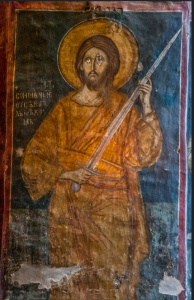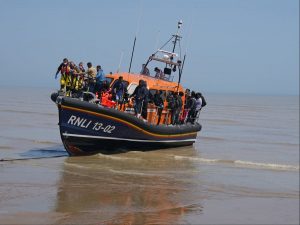Nerys writes: Our Gospel passage today, Luke 12.49-56, contains eight of the toughest verses in Luke’s Gospel. I wonder what you make of them? I find these words of Jesus unexpectedly harsh and also very puzzling. How could the one whose birth was announced with a promise of peace, who brought peace to troubled minds and hearts, who encouraged his disciples to offer words of peace to all they met, speak so stridently about bringing fire to the earth and division to families?

An unusual fresco of Jesus holding a sword from Decan Monastery in Kosovo.
Theologians down the centuries have not been able to agree about how to interpret this passage. Some have seen it as a justification of religious conflict or even as a warrant for war. When we read it in the light of the whole Gospel story, however, we see it as descriptive rather than prescriptive. It wasn’t Jesus’ purpose to set children against their parents but he knew that his coming to the world would bring about such divisions. In the words of Simeon at his dedication, he was the child ‘destined for the falling and rising of many in Israel’. He knew that the kingdom of peace he was inaugurating would only be established through confronting ‘the powers that be’ of his day and that if he was to persevere, he himself would be caught up in the crisis. As he spoke the stern words of our passage, he was on the road to Jerusalem, on a journey towards rejection, abuse and death at the hands of those who were ready to fight tooth and nail to protect the status quo.
Jesus knew that the consequence of his followers’ choice to imitate his trust in the Father would be tension and trauma within families, communities and nations. We see that this is nothing new when we read our New Testament passage, Hebrews 11.29-12.2. The author writes of the cloud of witnesses, the people of faith who came before us. Some are celebrated for achieving great victories but many, many more are remembered for the suffering which they endured as a consequence of their choice to live their lives by faith.
It is very tempting today as it was in Jesus’ day to ignore what’s going on in the wider world. Luke’s Jesus challenged the crowd to read the signs of the times by looking at current events, just as they would forecast the weather by looking at the sky. He challenged them to take a hard look at the oppression and corruption their people were enduring and to accept that Israel was at a crossroads. A crisis was coming and they needed to decide how they would react to it before it was too late.
Today, our role as the church, is to become aware of the unjust systems of our day and to expose them with the light of the Gospel message of love. We are called to imitate Christ by speaking out for justice, treating every human being as our sister and brother, showing mercy to all those in need.
We choose to do this knowing that it won’t be easy and that we will face hostility from within and without. As the author of the letter to the Hebrews has reminded us, the race that is set before us is not a sprint but a marathon. It requires endurance and perseverance. There are all kinds of obstacles and difficulties that hinder our progress. But we don’t run the race alone. Christ runs ahead of us, clearing the way, setting the pace. What we need to do is to follow him.

At the 10.30 a.m. service today, our own Roger Lockwood, chair of the Scottish Council of the RNLI will be speaking about the volunteer lifeboat crews in the Channel who for the last five years or so have been rescuing asylum seekers who attempt to get to the UK in dinghies or small boats. In your time of prayer today, I invite you to consider in the presence of Christ your response to the needs of all those who have been driven from their homes and communities by hardship or violence.
Loving God, make me aware of the signs that are all around me of an unjust world where many suffer needlessly because of war, greed and complacency.
Help me not to look away but through my prayers and my actions, may I respond with mercy and love.
Make us at St Mary’s a holy church, a healing church, a hospitable church.
We pray for our bishops following the Lambeth Conference.
We pray for our young people following the Provincial Youth Gathering.
We pray for all known to us who are struggling or in need.
Help us to raise to the challenges you lay before us however costly and uncomfortable,
God, whose purpose is to kindle,
now ignite us with your fire.
While the earth awaits your burning,
with your passion us inspire.
Overcome our sinful calmness,
stir us with your saving name.
Baptize with your fiery Spirit,
crown our lives with tongues of flame.
God, who still a sword delivers
rather than a placid peace,
with your sharpened word disturb us,
from complacency release!
Save us now from satisfaction,
when we privately are free,
yet are undisturbed in spirit
by our neighbour’s misery.
God, who in your holy gospel
wills that all should truly live,
make us sense our share of failure,
our tranquility forgive.
Teach us courage as we struggle
in all liberating strife.
Lift the smallness of our vision
by your own abundant life.
Elton Trueblood (can be sung to ‘Ode to Joy’)






